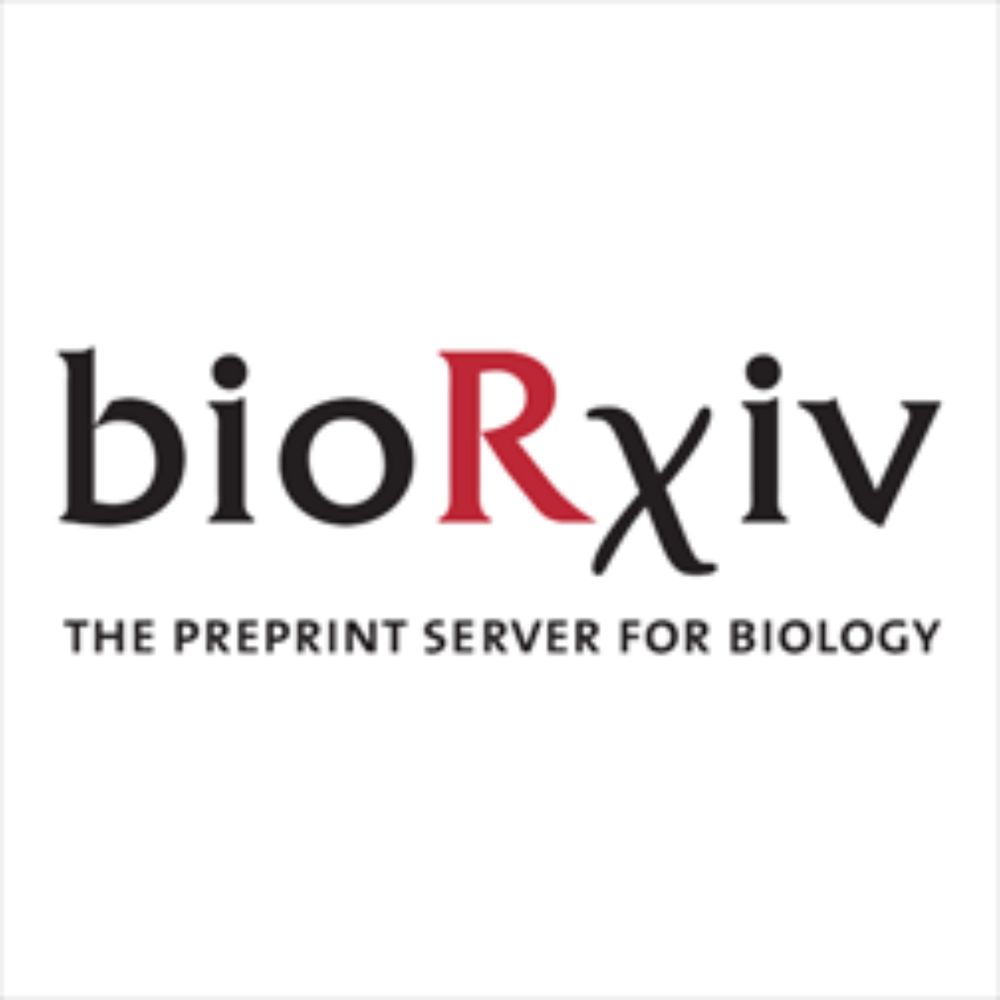
🔥🔥🔥 New preprint!
Our new work explores the dynamic behaviour of muscle stem cells and their niche interactions in Duchenne Muscular Dystrophy.
www.biorxiv.org/content/10.1... #MyoBlue

🔥🔥🔥 New preprint!
Our new work explores the dynamic behaviour of muscle stem cells and their niche interactions in Duchenne Muscular Dystrophy.
www.biorxiv.org/content/10.1... #MyoBlue
This looks great, congratulations Mareike!
14.03.2025 16:07 — 👍 1 🔁 0 💬 0 📌 0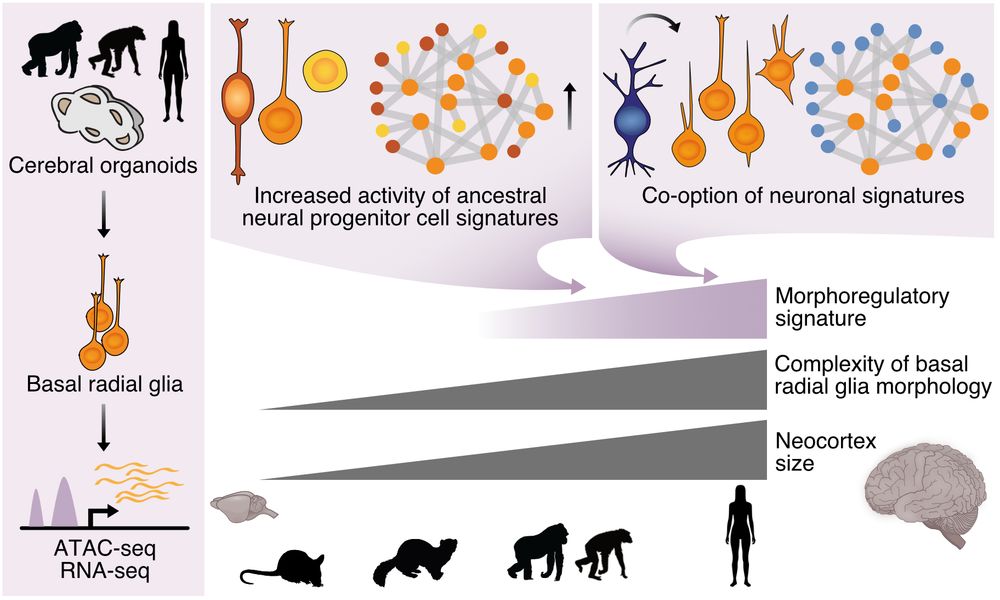
💫 New preprint from the lab: Comparing great ape cerebral organoids, we found that human-specific morphoregulatory signatures in basal radial glia characterise neocortex evolution. Fantastic work from super-talented PhD student Theresa Schütze!
www.biorxiv.org/content/10.1...
we were really quite a lot!
07.03.2025 15:48 — 👍 3 🔁 1 💬 0 📌 0Haha, my kids to this all the time, I cannot get myself to even try!
13.01.2025 07:53 — 👍 1 🔁 0 💬 0 📌 0
Congrats Li, fantastic work !!
(We can change our citation of your work from BioRxiv to Nature now ;))
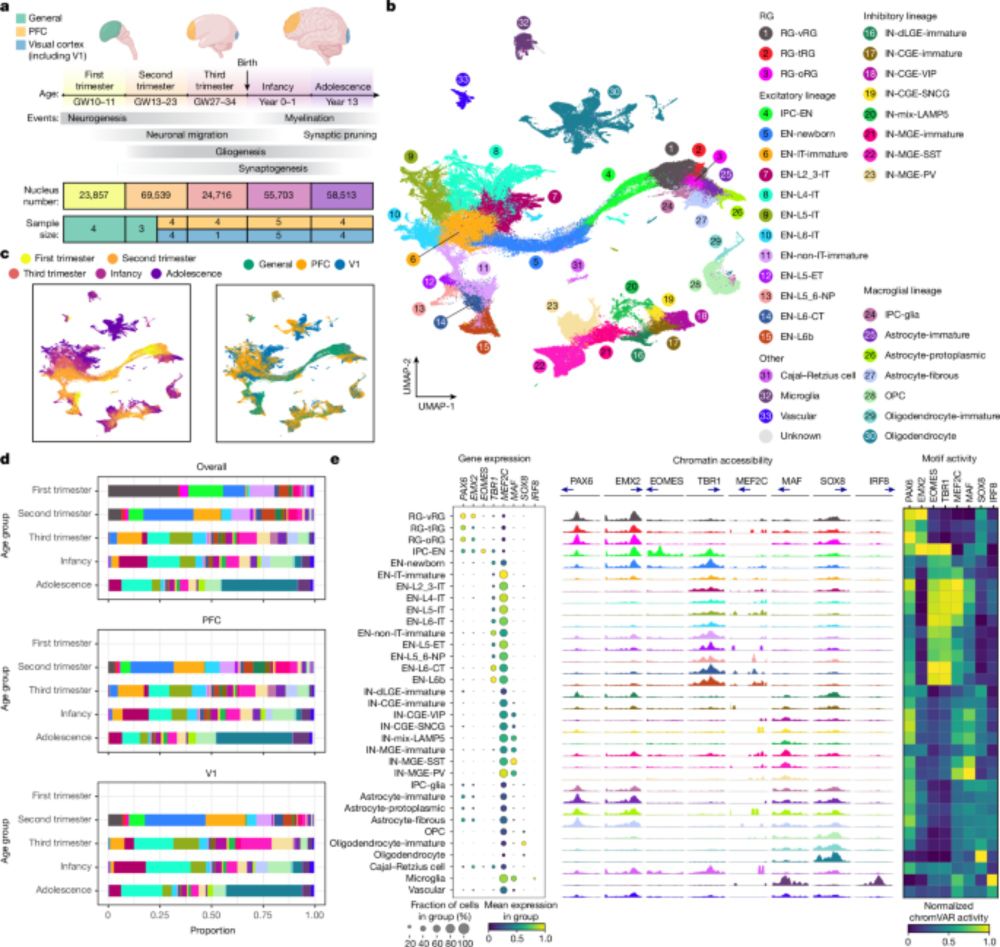
Brain cancer leverages the same tools as the developing brain 🧠! In our new study from the Kriegstein and Li labs, published today in @nature.com, we mapped neocortical development to explore brain cancer and neuropsychiatric risks. #stemcells #brainresearch
www.nature.com/articles/s41...
Thank you Ana!
10.01.2025 13:31 — 👍 1 🔁 0 💬 0 📌 0Thank you!
10.01.2025 13:31 — 👍 1 🔁 0 💬 0 📌 0I want to thank everyone involved in this work on top of Ryszard who did an amazing job. Laure Coquand, Amandine Di Cicco, Christophe Chehade, @clarissebrunet.bsky.social @pauline-lestienne.bsky.social, Julia Ladewig, Karin Forsberg-Nilsson, Fabien Guimiot and our fantastic imaging facility!
09.01.2025 12:15 — 👍 2 🔁 2 💬 1 📌 0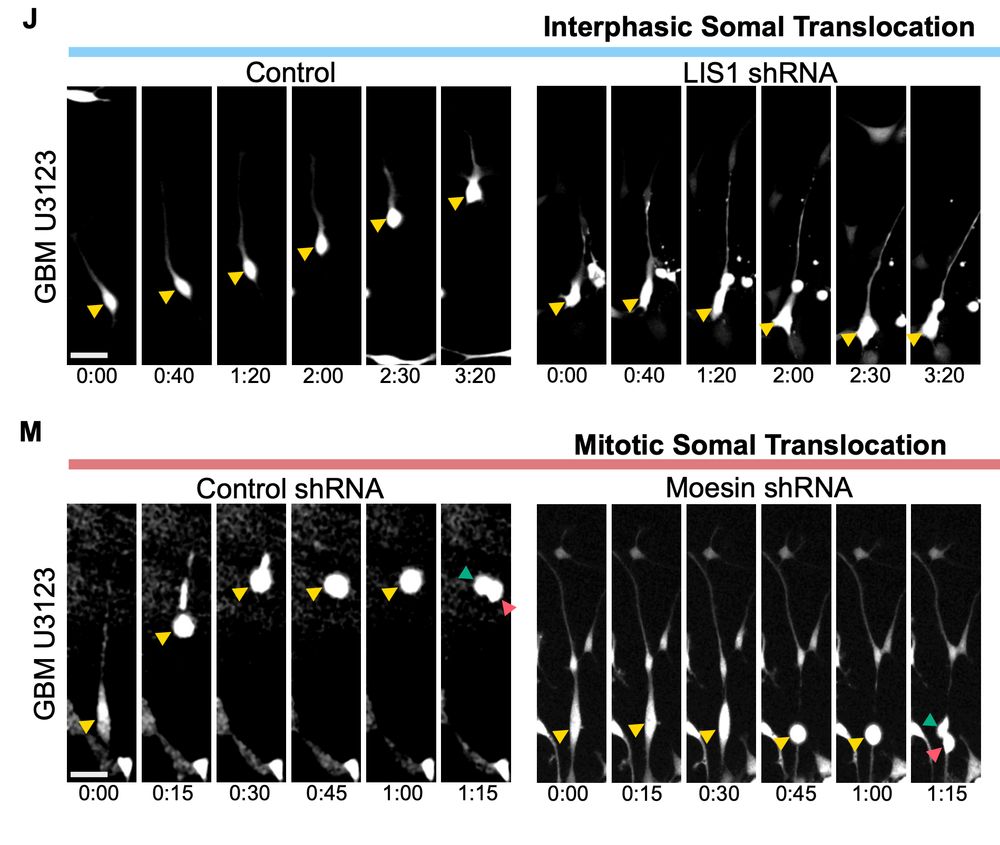
Using 9 different glioblastoma lines we show that IST and MST both occur, although not in all cells, reflecting the heterogeneity of these tumors. Strikingly, glioblastoma undergoing IST and MST did so using the same molecular mechanism as the ones identified here in bRG cells.
09.01.2025 12:15 — 👍 4 🔁 2 💬 1 📌 0Finally, because past work form @bhadurilab.bsky.social and others had shown a facilitating similarity between bRG cells and glioblastoma cells (including the presence of MST), we tested the conservation of our mechanisms in these cells.
09.01.2025 12:15 — 👍 3 🔁 1 💬 1 📌 0Therefore, microtubule related genes are more likely to affect human oSVZ expansion than actin-related ones.
09.01.2025 12:15 — 👍 0 🔁 1 💬 1 📌 0These numbers are quite different in organoids where MST is dominant. Overall, IST and MST combined lead to a net movement of 0,67 mm per month of fetal gestation, during the second trimester. The rest of the displacement is due to proliferation and tissue growth (we estimate 50%)
09.01.2025 12:15 — 👍 0 🔁 0 💬 1 📌 0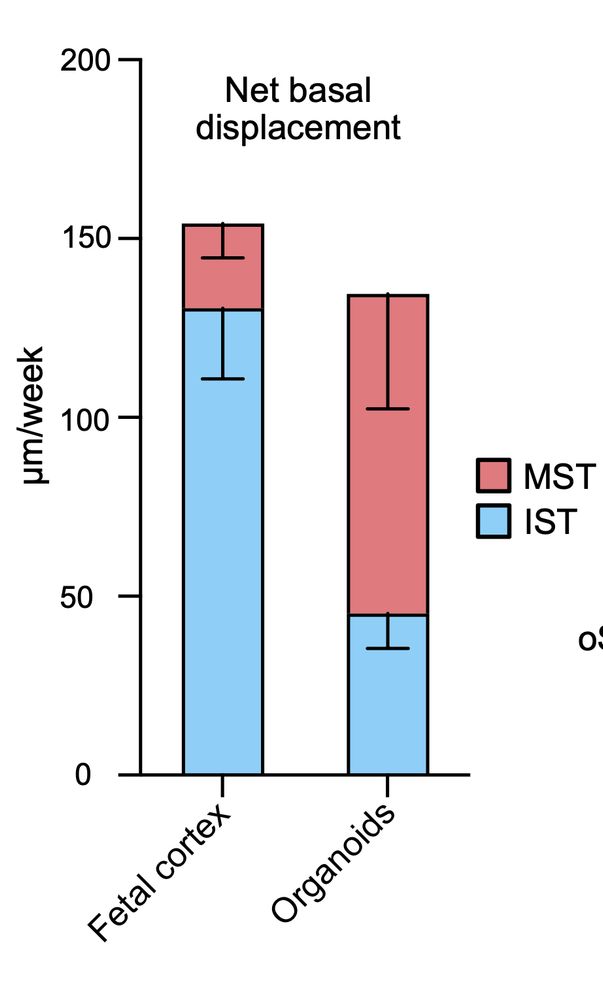
So MST and IST are totally different mechanisms, but what is their relative contribution to bRG dissemination in the human fetal cortex? After extensive recording in fetal explants, Ryszard could show that IST contributes to 85% of the total basal movement, while MST contributes to 15%.
09.01.2025 12:15 — 👍 1 🔁 1 💬 1 📌 0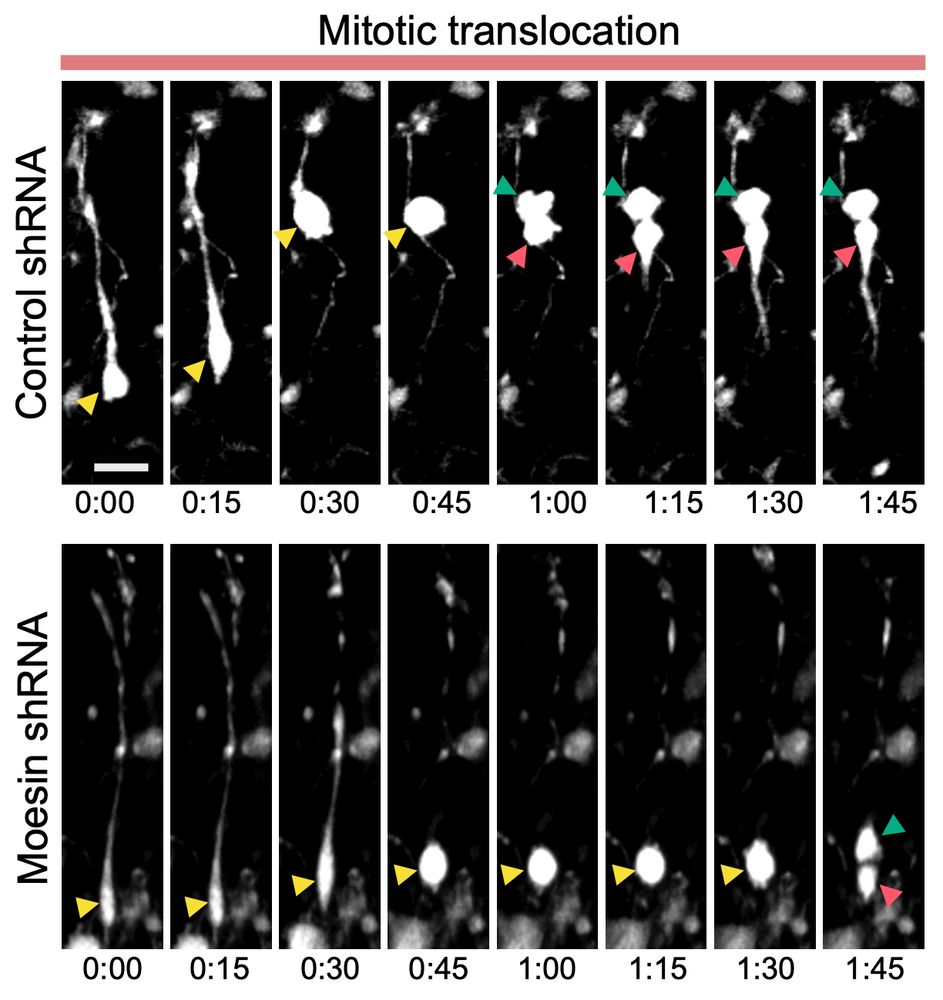
Mechanistically, we demonstrate that MST is dependent on the mitotic cell rounding pathway, that enables most adherent cells to round up for proper chromosome segregation through an increase of the cell cortex stiffness. Knocking down ERM proteins (Ezrin-Radixin-Moesin) or Vimentin all alter MST.
09.01.2025 12:15 — 👍 2 🔁 1 💬 1 📌 0We next focused our attention on MST and, using Sir-tubulin dyes, first showed that it occurred after nuclear envelope breakdown, and is therefore a mitotic spindle translocation event!!! I find this crazy, and to our knowledge quite unique in biology (so far...).
09.01.2025 12:15 — 👍 2 🔁 1 💬 1 📌 0Together, this microtubule-dynein-LIS1-LINC pathway generates pulling force and the nucleus, for translocation. Interestingly, this mechanisms is different from INM in aRG cells, but similar to nucleokinesis in neurons. Neuronal migration disorders may therefore also result from bRG cell defects.
09.01.2025 12:15 — 👍 2 🔁 1 💬 1 📌 0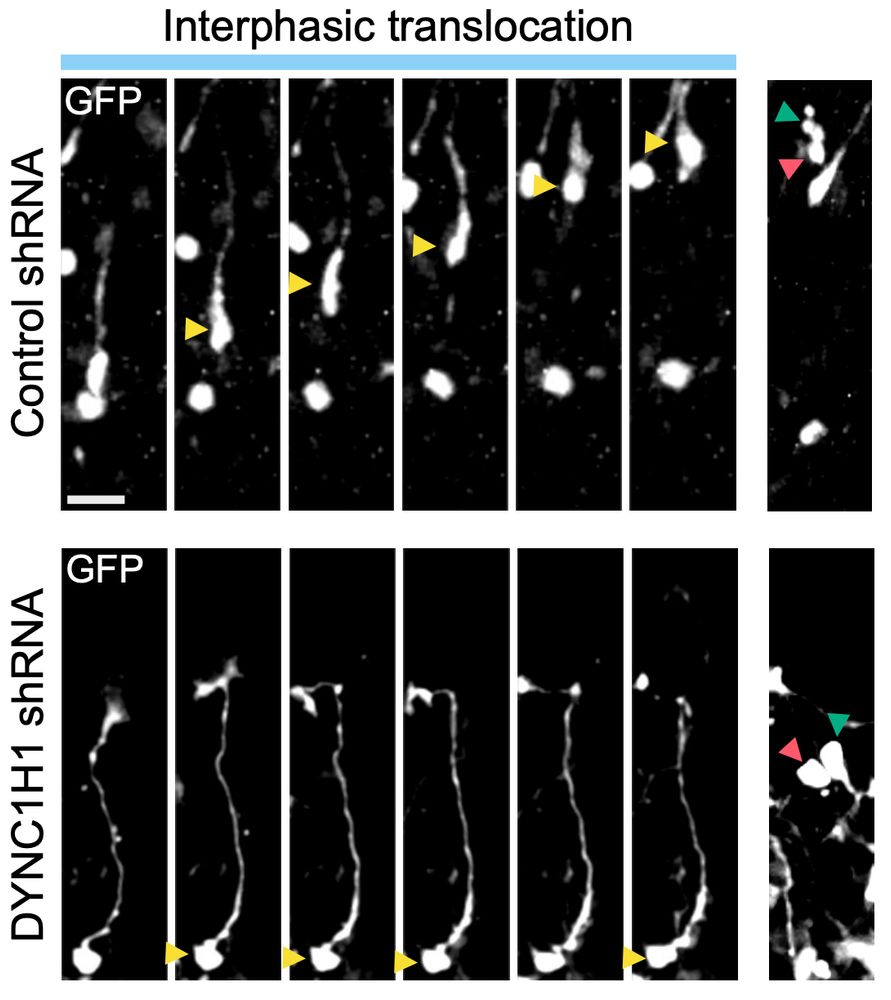
We demonstrate that IST is dependent on the dynein motor and its activator LIS1. Accordingly, IST is severely affected in LIS1-patient derived organoids (Lissencephalic). We also show that the dynein-LIS1 complex is recruited to the nuclear enveloppe (and underlying Lamins) via the LINC complex.
09.01.2025 12:15 — 👍 3 🔁 1 💬 1 📌 0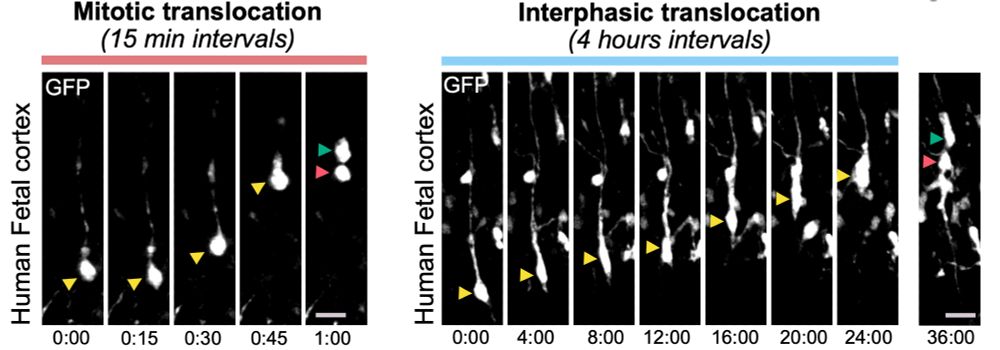
On top of identifying the mechanism for MST, we realised that bRG cells also translocate during interphase, a process we call Interphasic Somal Translocation (IST). We show that IST is microtubule dependent and actomyosin independent, while MST is actomyosin-dependent and microtubule independant.
09.01.2025 12:15 — 👍 2 🔁 1 💬 1 📌 0bRG cells were known to translocate rapidly during mitosis, a process called Mitotic Somal Translocation (MST). This translocation relies on acto-myosin contractility and was identified by the Kriegstein lab.
09.01.2025 12:15 — 👍 3 🔁 1 💬 1 📌 0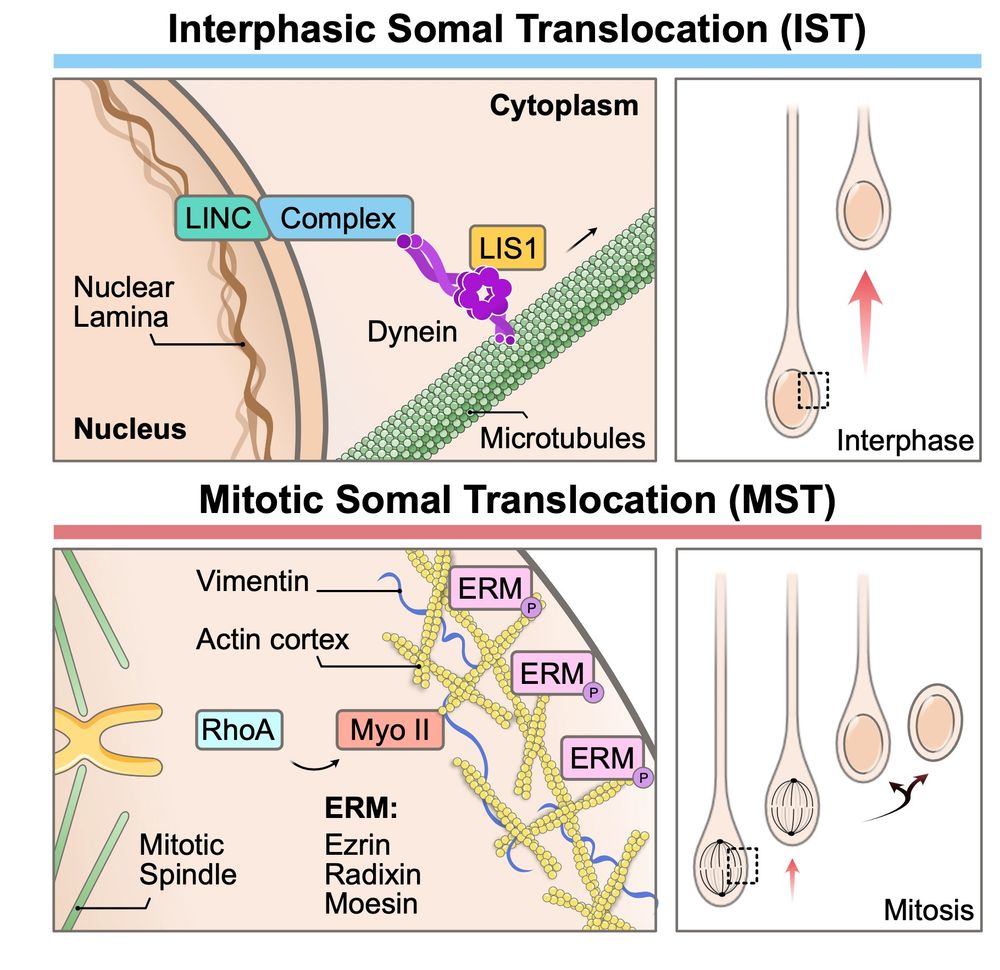
Great work from @ryszardwimmer.bsky.social, who live imaged and manually tracked over 11,000 human bRG cells, for 48-96 hours 😱. (I feel bad)
What he realised is that bRG cells have two, totally independent modes of migration, for which he managed to identify the molecular mechanisms.
Our new paper is out in BioRxiv. Using human fetal tissue and cortical organoids, we figured out how human bRG cells colonize the developing neocortex to expand the oSVZ stem cell niche. Turns out, it's a more complex process than we had anticipated!
www.biorxiv.org/content/10.1...
Thanks Victor and co!
08.01.2025 11:26 — 👍 1 🔁 0 💬 0 📌 0Hi there!
08.01.2025 11:26 — 👍 0 🔁 0 💬 0 📌 0Thank you Julien, happy new year!
07.01.2025 12:43 — 👍 1 🔁 0 💬 0 📌 0(Yes, the motivation is a preprint I want to share with you in the next couple of days)
07.01.2025 12:42 — 👍 8 🔁 0 💬 1 📌 0Just arrived here after one year out of twitter!
07.01.2025 11:48 — 👍 15 🔁 0 💬 4 📌 0